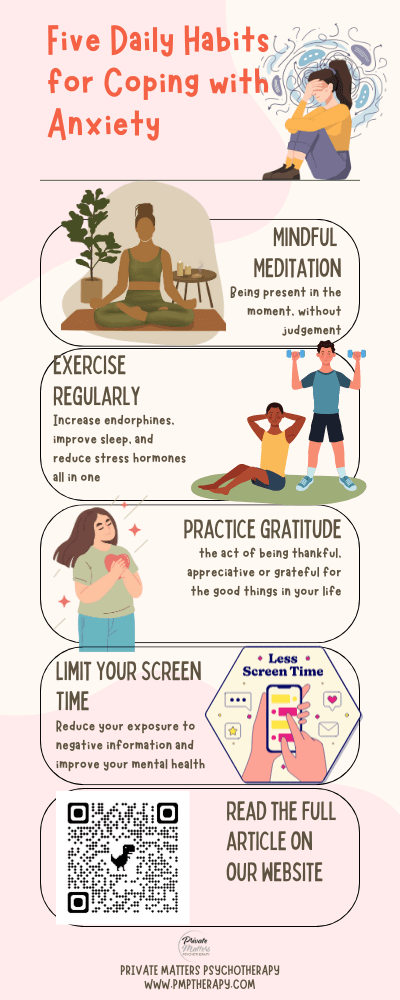5 Simple Daily Habits To Cope With Anxiety
Anxiety is a very common mental health issue that affects people of all ages and backgrounds and can be triggered by various factors, including stress, trauma, and genetics. According to the Canadian Mental Health Association, anxiety disorders are the most common mental illness in Canada, with an estimated 12% of the population experiencing an anxiety disorder in any given year. Anxiety can manifest in various forms, such as generalized anxiety disorder, social anxiety disorder, panic disorder, obsessive-compulsive disorder, and post-traumatic stress disorder.
While anxiety can be a debilitating experience and affect all aspects of a person’s life, there are several simple daily habits you can add to your daily routine to help to deal with your anxiety and improve your overall wellbeing.


Practice Mindfulness Meditation
Mindfulness meditation is a technique that involves focusing your attention on the present moment, while creating a non-judgemental and curious awareness of yourself and your surroundings. It can help you become more aware of your thoughts, feelings, and bodily sensations, allowing you to observe them instead of trying to change them.
Meditation is a life skill, not a quick habit to learn. The number one reason for people to give up on adding meditation to their day, is that they cannot clear their mind. Meditation is not about clearing your mind, or getting frustrated that you cannot clear your mind (that would be a judgement). Meditation is about noticing and observing that you cannot clear your mind, and refocusing your thoughts on your breath.
To start adding mindfulness meditation into your daily routine, set aside 10-15 minutes each day to sit in a quiet place and focus on your breathing. Try to stay present and merely notice any distracting thoughts that arise. You can use guided meditation apps or videos to help you get started if you’re new to meditation.
Exercise Regularly
This one does not come as a surprise: regular exercise is healthy for body, mind and soul. Regular physical activity can increase the production of endorphins, which are one of four happy chemicals in the brain that make you feel good. It can also improve your sleep quality and help you maintain a healthy weight. Physical activity has been shown to decrease levels of the stress hormone cortisol, which can also help to reduce symptoms of anxiety. Exercise has been further been found to promote neuroplasticity, which is the ability of the brain to change and adapt. Neuroplasticity allows the brain to form new connections and pathways, which can help to reduce symptoms of anxiety. An example of neuroplasticity at work is in practicing gratitude (read more below).
To incorporate exercise into your daily routine, find an activity that you enjoy, such as jogging, swimming, or yoga. Aim for at least 30 minutes of moderate-intensity exercise most days of the week. You can also break up your exercise into shorter sessions throughout the day if that’s more manageable.

Practice Gratitude
Gratitude is the act of being thankful, appreciative or grateful for the good things in your life. Gratitude is not about the big, earth shattering, life altering moments in your life. Gratitude is about recognizing (and noticing, to keep up with the theme of mindfulness) the smaller things that might be easily overlooked. An example would be “That first sip feeling” (thank you Starbucks) for your morning coffee, or smelling the roses on a nice spring morning, or looking out over Lake Ontario for your morning walk and noticing a beautiful sunset.
Practicing gratitude regularly can help shift your focus away from negative thoughts and emotions and improve your overall mood (neuroplasticity at work once again). It can also improve your relationships with others and help you feel more connected to the world around you.
To practice gratitude, set aside a few minutes each day to reflect on three things you’re thankful for. Write them down in a journal or simply take a few moments to think about them. Focus on the positive aspects of your life, no matter how small they may seem.
Limit Your Screen Time
Ever have a feeling that watching the news just makes you feel more anxious and more sad? Or that scrolling through Tik Tok or Instagram videos makes you feel more self-conscious and less happy with yourself? Research has shown that excessive screen time can contribute to feelings of anxiety and depression. Spending too much time on social media or watching the news can be overwhelming and lead to a sense of hopelessness and despair. By limiting your screen time, you can reduce your exposure to negative information and improve your mental health.
To limit your screen time, set boundaries for yourself, such as turning off your phone at a certain time each night or avoiding social media for a few hours each day. You can also try replacing screen time with other activities, such as reading a book, going for a walk, or spending time with loved ones.
Get Enough Sleep
Sleep is essential for good mental and physical health. Lack of sleep can exacerbate feelings of anxiety and make it harder to manage your symptoms. Getting enough rest can help improve your mood, increase your energy levels, and improve your ability to cope with stress.
“The way to a more productive, more inspired, more joyful life is getting enough sleep.”
By Arianna Huffington, the co-founder of The Huffington Post and author of the book “The Sleep Revolution”.
To improve your sleep quality, try to stick to a consistent sleep schedule and create a relaxing bedtime routine. Avoid using electronic devices in bed, as the blue light emitted by screens can interfere with your sleep cycle. You can also try practicing relaxation techniques, such as deep breathing or progressive muscle relaxation, before bed to help you fall asleep more easily.
To sum everything up, anxiety can be a challenging condition to manage, but by picking one of these five daily habits and working them into your routine, you can use the concept of neuroplasticity to teach your brain a healthier way of working with anxious feelings.

 Book A Free Consultation
Book A Free Consultation